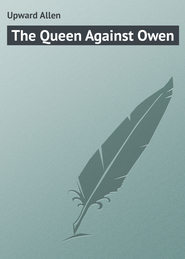По всем вопросам обращайтесь на: info@litportal.ru
(©) 2003-2024.
✖
Athelstane Ford
Настройки чтения
Размер шрифта
Высота строк
Поля
He stopped, biting his lips, and looked at me, as if he would know what I suspected. I returned his look with interest.
“And I, too, fear,” I answered solemnly. “And pray heaven that my fear is unfounded, for if it should turn out otherwise, after your persuading her to trust in your protection, I tell you plainly, Rupert Gurney, that I will never rest till I see you dead at my feet.”
Though I thus threatened him, nevertheless I believed that he was really at a loss and anxious to find out what had become of Marian. He presently said to me —
“I will go now and make a further search, and if I hear any news, will let you know. And do you, on your part, trust me. If in the meantime I can do anything to effect your release, I will.”
With that he went off. About the same time an order arrived for our removal, and we were carried away to another part of the fort.
Whether in consequence of my cousin’s representations or of Meer Jaffier’s, as is more probable, Surajah Dowlah suddenly decided to release all his English prisoners, except three or four of the principal ones, including Mr. Holwell. This intelligence was brought us about supper time, and an officer shortly after attended, to make the selection of those who were to be continued in captivity.
Not apprehending that any importance could be attached to me, I rose joyfully to go out with those who were being dismissed, when, to my surprise, the officer told me in their language, very sharply, to keep my place.
“But why do you seek to detain this young man?” inquired Mr. Holwell. “He is not a person of any consequence among us.”
The Moor shook his head.
“This youth is to be kept in the Nabob’s hands because he is a friend of Sabat Jung’s,” he answered.
It may be imagined how mortified I was to find my boasting of the friendship of Colonel Clive thus turned against me. There was no help for it, however. With a heavy heart we saw our fellow-prisoners depart, some of them to examine their houses in Calcutta, others to take refuge with the English fleet, which about this time dropped down the river to Fulta, where it lay.
I heard afterwards that when the refugees arrived on board, and told the woeful tale of what had followed on the capture of Fort William, Mr. Drake and those with him bitterly repented of their cowardice and desertion. Messengers, that is to say, Indian spies, had already been despatched by land to Madras, the voyage thither being impossible at this time on account of the prevalent monsoon. Others were now sent after them, with letters recounting the whole of these transactions, and urgently entreating the Madras council to despatch succour at the earliest possible moment.
In the meanwhile, to pass over the next few days, Surajah Dowlah, finding no further mischief to execute in Calcutta, after he had plundered all the principal merchants, placed a force there under the command of an officer named Monichund, and marched back to Moorshedabad, carrying me in his train. My fellow prisoners, consisting of Mr. Holwell and two other gentlemen, named Walcot and Court (for poor Mr. Byng had been among those who perished in that cell of death), were despatched separately in irons, by a boat up the river.
If I had been traversing this strange, and in many parts beautiful, country under other circumstances I might have found much to interest me. But being, as I was, still weak and wretched from the effects of the night passed in the Black Hole, and, moreover, very anxious and troubled in mind about the fate of Marian (besides my own), I heeded little of it. The country was extremely flat, and much overgrown with trees, particularly mangoes, which tree hath a most delicious fruit, very grateful after toiling along the barren roads in the intolerable heat of this climate. Travelling in company with an army, we were not able to see much of the country people, who feared the Nabob’s character, and for the most part deserted their villages and retired into the woods while we passed. One day we lay without the walls of Chander Nugger, the French settlement in Bengal. These Frenchmen had managed to propitiate Surajah by aiding him with a supply of ammunition when he was on his march against Calcutta. To this they now added a large sum of money, and by this means prevailed on him to pass on without entering their town. They no doubt rejoiced, like true Frenchmen, at the misfortunes which had overtaken the English, not foreseeing at this time the happy revolution in our affairs which was to make them sing to another tune.
Our progress through the country was so gradual that it was about three weeks before we at last reached the Nabob’s capital. During our long march I had not once seen my cousin, nor did I know what had become of him, nor whether he had stayed behind in Calcutta or attached himself to the Moors’ army.
Moorshedabad is a great, rich place, very oriental in character, there being no foreigners resident in it, except a few Armenians, a race of thieves and pedlars, worse than Jews, who also infested Calcutta. But I had little opportunity of exploring its bazaars and palaces at this time, being conveyed straight to a filthy hut, formerly used as a cowshed, standing outside the Nabob’s palace, where I found my companions already arrived, and where I was forced to lie on straw, and not allowed to move abroad.
In this miserable place, guarded by sentries, we lay for some days, being all of us too feeble to contrive any plan of escape. Each morning Surajah Dowlah sent a messenger to us, to ask if we were yet prepared to disclose the truth about the treasure. We were informed that he was deeply incensed at the failure of his raid on Fort William, to which it seems he had looked to bring enormous sums into his treasury.
On the third or fourth night, just as I was settling myself to sleep on a rude heap of straw which I had gathered together against the wall of the shed, the door softly opened and a man entered. As soon as he spoke I knew him at once to be my cousin Rupert.
“Which of you is named Ford?” he asked, speaking in the Indian language; for it was too dark for him to see my face.
“I am,” I answered in English, sitting up.
He placed his finger to his lips, and stepped across the hut to where I was, while my three companions raised themselves eagerly on their elbows, to know what passed.
Rupert, who still wore his Moor’s dress, kneeled down on the straw beside me, and whispered in my ear —
“Hist! I am come to arrange for your escape, but you must say no word to these others, lest they should want to join you, which would only serve to ruin our chance.”
“In that case,” said I, answering him aloud in English, for I mistrusted him, “it is useless to proceed. I will entertain no project to escape which does not include these gentlemen here with me.”
Rupert ground his teeth, cursing me beneath his breath for a fool. But Mr. Holwell promptly rebuked me.
“You are not to act like that, Ford,” he said. “Neither I, nor, I am sure, either of these other gentlemen would consent that you should refuse any offer of escape merely because it is not extended to us also.”
My cousin, seeing that I was resolved not to have the conversation private between us two, now addressed himself to the others.
“I heartily wish it were in my power to deliver you all, gentlemen, but unfortunately that is what I can’t do. I have secured a means by which I may carry off my young kinsman here, though at great danger to myself. But if it comes to the four of you, then I confess I must abandon the scheme.”
On this Mr. Holwell renewed his protestations, urging me by no means to neglect Rupert’s offer.
“But how is it, sir,” he added, speaking not unkindly, “that I find you, an Englishman, and a relation of young Mr. Ford, in these parts, and apparently in a position of influence with the natives?”
“Oh, as to that, it is an old story,” replied my cousin, coolly. “I came to Bengal first by land from the Malabar coast, in the time of the late Nabob, and for that reason I was not at first included in the hatred which Surajah Dowlah bore to the English on the Hooghley. However, the efforts which I made to restrain the Nabob’s vindictive proceedings, and the disgust which I showed at his late barbarities, have greatly weakened my credit with him. I believe he knows or suspects that I am merely casting about for an opportunity to quit his service, and has set spies on me accordingly. I have at last devised measures for making my way down to the coast, to our fellow-countrymen, and have bribed your gaolers to allow my cousin Ford to escape with me to-night, if he will.”
So earnestly did Gurney tell this tale that I could see Mr. Holwell and the others were very favourably impressed, and took him for an honourably behaved man. As for me, I felt my cheeks burn with shame as I sat and listened, yet I neither felt inclined to admit to these gentlemen that I was cousin to a villain and a traitor, nor did I consider it to be my duty to denounce my own blood.
I therefore held my peace, while the conversation went on between the others. Mr. Holwell insisted that I should take Rupert’s offer, and be the means of conveying news to our friends of where the other three lay. I demurred, and should perhaps have rejected the invitation in the end, had not my cousin taken advantage to slyly whisper in my ear —
“Don’t you understand, fool? I have news of Marian, and want your aid to carry her off from Surajah Dowlah’s harem!”
CHAPTER XIII
A NIGHT ADVENTURE
As soon as I had heard that name from Rupert’s lips, all my hesitation was at once overcome, as he no doubt foresaw would be the case.
“Come,” I said, springing upon my feet with an energy I had not felt for some time, “let us be going, then.”
My fellow prisoners looked not a little astonished at this sudden change in my resolution. However, they offered me their good wishes for the journey, and Mr. Holwell in particular entrusted me with some messages to Mr. Drake, in case I should succeed in penetrating to him. We had no certain information at this time as to the whereabouts of the English ships, but supposed them to be lying somewhere about the mouth of the Hooghley. It was judged best that I should carry no writing.
We two then crept softly out of the hut, my cousin going first, and I following. There was no moon abroad, but a sufficiency of light was afforded us by the extraordinary brilliancy of the stars, which appear much bigger, as well as thicker in the sky, in these latitudes than in England. At a short distance from the door of the shed I could perceive the sentinel, seated with his back towards us, his hands resting on his matchlock.
“This way,” whispered Rupert in my ear. And turning in the opposite direction from the sentry, he stooped down and ran along under the shadow of a high wall which bordered a winding road.
The wall was about eight feet high, and enclosed a garden. Here and there it was overhung by branches of trees, whose foliage I failed to distinguish in the darkness, but I once or twice thought I smelt the fragrance of lemons. Within the garden behind the wall we could hear the tinkle of a fountain and a noise like the singing of some bird.
“What is this place?” I asked in a whisper, as I ran along by Rupert’s side.
“Hush!” he answered crossly. “We shall be overheard. This is the Nabob’s garden, where are the pavilions of his women.”
We ran on in silence for some little time longer, when we arrived at the end of the garden, and plunged into a narrow and dark lane that led out of the town. This passage we followed till we came out upon a deserted nook immediately under the walls of Moorshedabad, which were here much damaged, and matted with ivy and other weeds.
“Now,” said Rupert, as he flung himself panting on the ground, in a little grassy place, “we can talk over our plans without fear of being disturbed.”
I sat down beside him, inly marvelling at that great transformation which had so quickly converted us from deadly enemies seeking each other’s lives, into allies, if not friends. After all our hostilities against each other in Great Yarmouth, at Gheriah, and in Calcutta, we were now in Moorshedabad, bound together by a common purpose, and that purpose concerned with her who had originally been the cause of our enmity.
I have often thought since that the change which took place in my cousin’s behaviour about this time was due, not so much to any tardy pricks of conscience, as to a sort of dizziness of mind, brought about by the spectacle of the prodigious crimes of Surajah Dowlah. His own spirit, however bold and wicked, was daunted in the presence of this being who, though so much younger in years, was so greatly superior in evil; so that he shrank back, like one brought suddenly to the edge of a precipice. Perhaps he had a secret apprehension of his coming fate; at all events, it is certain that for a short time he manifested a hearty longing to return to the society of honest men.
As soon as we were seated his first act was to pluck off the turban he wore on his head, and cast it to the ground.
“Faugh!” he exclaimed. “What an intolerable thing to wear! If it were not for their turbans and their abstinence, I declare Mahometanism would suit me well enough.”







